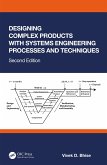Realizing Complex System Design
Herausgeber: Ambler, Anthony P.; Sheppard, John W.
Realizing Complex System Design
Herausgeber: Ambler, Anthony P.; Sheppard, John W.
- Gebundenes Buch
- Merkliste
- Auf die Merkliste
- Bewerten Bewerten
- Teilen
- Produkt teilen
- Produkterinnerung
- Produkterinnerung
The creation of complex integrated systems is, in itself, complex. It requires immense planning, a large team of people with diverse backgrounds, based in dispersed geographical locations (and countries) supposedly working to a coordinated schedule and cost.
Andere Kunden interessierten sich auch für
![Evolving Toolbox for Complex Project Management Evolving Toolbox for Complex Project Management]() Evolving Toolbox for Complex Project Management165,99 €
Evolving Toolbox for Complex Project Management165,99 €![Designing Complex Products with Systems Engineering Processes and Techniques Designing Complex Products with Systems Engineering Processes and Techniques]() Vivek D BhiseDesigning Complex Products with Systems Engineering Processes and Techniques194,99 €
Vivek D BhiseDesigning Complex Products with Systems Engineering Processes and Techniques194,99 €![Direct Copper Interconnection for Advanced Semiconductor Technology Direct Copper Interconnection for Advanced Semiconductor Technology]() Direct Copper Interconnection for Advanced Semiconductor Technology196,99 €
Direct Copper Interconnection for Advanced Semiconductor Technology196,99 €![Design Reliability Design Reliability]() B S DhillonDesign Reliability217,99 €
B S DhillonDesign Reliability217,99 €![Design for Reliability Design for Reliability]() Dana Crowe / Alec Feinberg (eds.)Design for Reliability326,99 €
Dana Crowe / Alec Feinberg (eds.)Design for Reliability326,99 €![Realizing Digitization-Enabled Innovation Realizing Digitization-Enabled Innovation]() Stefan Michael GenennigRealizing Digitization-Enabled Innovation37,99 €
Stefan Michael GenennigRealizing Digitization-Enabled Innovation37,99 €![Industry 4.0 Technologies for Business Excellence Industry 4.0 Technologies for Business Excellence]() Industry 4.0 Technologies for Business Excellence154,99 €
Industry 4.0 Technologies for Business Excellence154,99 €-
-
-
The creation of complex integrated systems is, in itself, complex. It requires immense planning, a large team of people with diverse backgrounds, based in dispersed geographical locations (and countries) supposedly working to a coordinated schedule and cost.
Produktdetails
- Produktdetails
- Verlag: Taylor & Francis Ltd
- Seitenzahl: 504
- Erscheinungstermin: 24. Dezember 2024
- Englisch
- Abmessung: 254mm x 178mm
- ISBN-13: 9781032036533
- ISBN-10: 1032036532
- Artikelnr.: 71234604
- Verlag: Taylor & Francis Ltd
- Seitenzahl: 504
- Erscheinungstermin: 24. Dezember 2024
- Englisch
- Abmessung: 254mm x 178mm
- ISBN-13: 9781032036533
- ISBN-10: 1032036532
- Artikelnr.: 71234604
Anthony P. Ambler is a Fellow of the IEEE, elected 'For contributions to economics of testing complex digital devices and systems'. His research interests are in test economics, system test and diagnosis. He received his B.Sc., M.Sc., and Ph.D. from the University of Manchester Institute of Science and Technology. He was appointed to a Chair in Test Technology at Brunel University (UK), and then moved to the USA. He became Chairman of Electrical & Computer Engineering at the University of Texas at Austin, then Dean of Engineering & Computing at the University of South Carolina, and recently as Dean of Technology at the University of Houston. In addition to his research work, he created the MS degree in Engineering Management at UT Austin. He has acted as Chair of the Organizing Committee of the European Design and Test Conference, General Chair and Program Chair of IEEE International Test Conference and of IEEE International Conference on Computer Design. He has created a number of Workshops including on Test Economics, System Test and Diagnosis, and Production Test Automation. John W. Sheppard is a Norm Asbjornson College of Engineering Distinguished Professor in the Gianforte School of Computing at Montana State University His research interests include fault diagnosis/prognosis of complex systems, model-based and Bayesian reasoning, explainable and ethical artificial intelligence, and distributed population-based algorithms. He is a Fellow of the IEEE, elected "for contributions to system-level diagnosis and prognosis." He received his BS in computer science from Southern Methodist University and his MS and PhD in computer science from Johns Hopkins University. Before entering academia full-time, he was a member of industry for 20 years where his prior position was as a research fellow at ARINC Incorporated. He has been a long-time leader in the IEEE Standards Association, chairing several working groups focused on publishing standards related to complex system test and diagnosis. Previously, he also served as the "designated representative" from the IEEE Computer Society to the IEEE Standards Coordinating Committee 20 on Test and Diagnosis for Electronic Systems.
"1: Introduction. Part 1: Properties of Effective and Reliable Design 2.
Reliability. 3. Availability. 4. Testability. 5. Maintainability. 6.
Diagnosability/Prognosability. 7. Fault Tolerant and Reconfigurable Design.
8. Design Reuse. Part 2: Project Management.
9. Proposal Engineering. 10. Project Planning. 11. Performance-Based
Logistics. 12. Collaboration. 13. Cultural Impact. 14. Intellectual
Property Management. Part 3: Requirements Analysis. 15. Systems Engineering
Vee. 16: Requirements Types - Design and Test. 17. System Decomposition.
18. Test-Driven Development. Part 4: Engineering Economics. 19. Time Value
of Money. 20. Production Management. 21.Test Economics. 22. Logistics and
Supply Chain Management. 23. Warranties and Product Liability"
Reliability. 3. Availability. 4. Testability. 5. Maintainability. 6.
Diagnosability/Prognosability. 7. Fault Tolerant and Reconfigurable Design.
8. Design Reuse. Part 2: Project Management.
9. Proposal Engineering. 10. Project Planning. 11. Performance-Based
Logistics. 12. Collaboration. 13. Cultural Impact. 14. Intellectual
Property Management. Part 3: Requirements Analysis. 15. Systems Engineering
Vee. 16: Requirements Types - Design and Test. 17. System Decomposition.
18. Test-Driven Development. Part 4: Engineering Economics. 19. Time Value
of Money. 20. Production Management. 21.Test Economics. 22. Logistics and
Supply Chain Management. 23. Warranties and Product Liability"
"1: Introduction. Part 1: Properties of Effective and Reliable Design 2.
Reliability. 3. Availability. 4. Testability. 5. Maintainability. 6.
Diagnosability/Prognosability. 7. Fault Tolerant and Reconfigurable Design.
8. Design Reuse. Part 2: Project Management.
9. Proposal Engineering. 10. Project Planning. 11. Performance-Based
Logistics. 12. Collaboration. 13. Cultural Impact. 14. Intellectual
Property Management. Part 3: Requirements Analysis. 15. Systems Engineering
Vee. 16: Requirements Types - Design and Test. 17. System Decomposition.
18. Test-Driven Development. Part 4: Engineering Economics. 19. Time Value
of Money. 20. Production Management. 21.Test Economics. 22. Logistics and
Supply Chain Management. 23. Warranties and Product Liability"
Reliability. 3. Availability. 4. Testability. 5. Maintainability. 6.
Diagnosability/Prognosability. 7. Fault Tolerant and Reconfigurable Design.
8. Design Reuse. Part 2: Project Management.
9. Proposal Engineering. 10. Project Planning. 11. Performance-Based
Logistics. 12. Collaboration. 13. Cultural Impact. 14. Intellectual
Property Management. Part 3: Requirements Analysis. 15. Systems Engineering
Vee. 16: Requirements Types - Design and Test. 17. System Decomposition.
18. Test-Driven Development. Part 4: Engineering Economics. 19. Time Value
of Money. 20. Production Management. 21.Test Economics. 22. Logistics and
Supply Chain Management. 23. Warranties and Product Liability"







